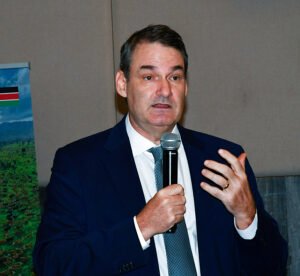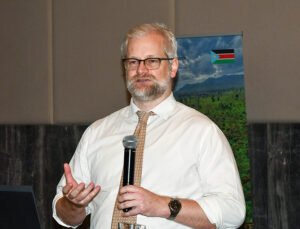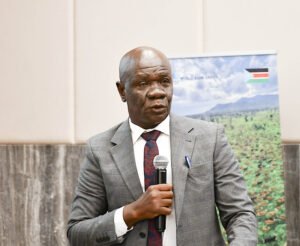By Matik Kueth
The World Bank Group on Monday unveiled the South Sudan National Resources Review (NRR) Report, a comprehensive assessment aimed at catalyzing the country’s inclusive economic growth and development.
The NRR report is the first to analyze three critical renewable resource sectors in South Sudan’s fisheries, forestry, and wildlife since independence in 2011.
Speaking at the launch, Charles Underland, World Bank Group’s Country Manager for South Sudan, stated that the report has provided a solid analytical foundation for a nation that holds significant promise.

Charles Underland, World Bank Group Country Manager for South Sudan [Photo – Matik Kueth, King News]
He said South Sudan’s natural wealth is a treasured asset, possibly second only to the magnificence of its people.
“I think we all know about some of South Sudan’s subsoil resources, oil, gold, but I think there’s also a lot of green gold out there on the surface here in South Sudan. These assets are huge, including the world’s largest wildlife migration, and one of the world’s largest freshwater fisheries. They’re critically important for the planet, of course, but these natural resources are critically important for the people of South Sudan,” he stated.
Underland noted that the World Bank believes there is room for the South Sudanese government to improve livelihoods and conserve its unique natural assets and remarkable cultures sooner.
Stephen Ling, World Bank Group’s Lead Environment Specialist, stressed that South Sudan boasts one of the world’s most prolific freshwater fisheries, due to the extremely changeable yearly flood dynamics of the enormous Sudd and surrounding White Nile floodplains.

Stephen Ling, World Bank Group’s Lead Environment Specialist [Photo – Courtesy]
However, Rizik Zacharia, Minister of Wildlife, Conservation, and Tourism, applauded the World Bank for its significant work, pointing out that the report might lay a path for the government to utilize the country’s resources in 2025.

Rizik Zacharia Hassan, Minister of Wildlife, Conservation and Tourism [Photo – Courtesy]
“We are privileged to be amonst you here to give audience for the report presentation which I am quite sure will be very fruitfull for the country. And here we are also previllaged also to enjoy this historical event of launching World Bank. In fact, the Republic of South Sudan is a country with multiple resources and high opportunities for its richness. But what remains now is the efficient utilization of those capabilities. In fact, we are a bit unfortunate because since our independence, we couldn’t have a forest so that we work by our own so that we manage whatever that we have. In fact, I’m here to appreciate the World Bank because now it seems 2025 will be a very blessed year. Now we are starting it with the launching of the findings of their assessments, which will lay the path, the eventual path for the breakthrough in terms of utilization of our resources,” he stressed.
According to the World Bank report, South Sudan’s natural habitats are vast, offering its sparse population a wealth of natural resources though approximately 75 percent of South Sudanese already rely directly on local ecosystems for essentials like food, clean water, and energy.
It revealed that the states with the most productive fisheries are Upper Nile, Jonglei, and Unity State, with the sector employing 30 percent or more of the population.
“The current fish catch according to the report is estimated at 300,000 tons per year and is likely significantly lower than average sustainable production, and much of its potential value of around $300 million at local market prices, roughly 70 percent is lost due to poor handling, postharvest physical and quality loss, and the inability to transport to regional markets dominated by foreign exporters, particularly to the Democratic Republic of Congo, where prices roughly double those in South Sudanese markets,” it stressed.
The report further highlighted that South Sudan has extensive forest cover of around 30 percent of the national land area, maintaining exceptionally high ecosystem integrity and potentially containing commercially valuable native species that neighboring countries have largely lost.



![Hon. Rizik Zachaira, Minister of Wildlife, Conservation and Tourism pose for a photo with the World BAk Group’s Country Manager on Monday January 27th, 2025 [Photo – Matik Kueth, King News]](https://kingmediassd.com/wp-content/uploads/2025/01/Hon.-Rizik-Zachaira-Minister-of-Wildlife-Conservation-and-Tourism-pose-for-a-photo-with-the-World-BAk-Groups-Country-Manager-on-Monday-January-27th-2025-Photo-Matik-Kueth-King-News-1-1170x780.jpg)